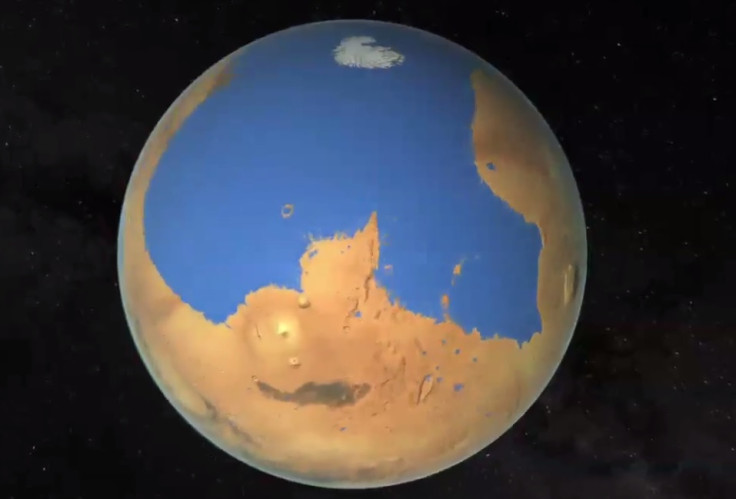Mediterranean on Mars: Ocean covered 20% of Red Planet surface long enough for life to thrive
Mars once had an ocean covering 20% of the planet's surface which was a similar depth to the Mediterranean, scientists have discovered.
Using data gathered with powerful ground-based telescopes, researchers from Nasa's Goddard Space Flight Centre were able to create maps of the atmospheric water across the Red Planet. They were able to show the distribution of water and how much the planet has lost over time – and, as a result, how much it once had.
Publishing their findings in the journal Science, the researchers found the ratio of heavy water compared to regular water in some regions was far higher than previously thought. Results showed the planet has lost 87% of its water.
They discovered this by measuring maps of atmospheric water and its deuterated form (where the hydrogen atom is replaced with heavy hydrogen atom). Heavy water remains trapped in the water cycle, while normal water is lost to space.
"The researchers found that the ratio of deuterated water to regular water in some regions is higher - perhaps sevenfold higher than in the Earth's oceans, for instance - than previously thought," a statement said. "These data can be used to reconstruct Martian water loss over time, and [lead author Geronimo] Villanueva and colleagues calculate that the planet might have had enough water to cover up to 20% of the planet about 4.5 billion years ago."
Villanueva told IBTimes UK: "They lead us to new areas of Mars that had water that we didn't know."

Scientists have long known that in its distant past, Mars had a warmer, wetter climate. But the question is just how wet it was.
Michael Mumma, Nasa Goddard senior scientist, said: "The really interesting question is, could it form a sea or ocean? And indeed it would. In the northern plains, which is a relatively flat region but depressed from the rest of the planet, it would form an ocean that was approximately 20% of the planet's surface area. So that is a respectable ocean.
"We now know Mars was wet for a much longer time than we thought before. Curiosity shows it was wet for 1.5 billion years, already much longer than the period of time needed for life to develop on Earth. Now we see Mars must have been wet for a period even longer."
Villanueva added: "This ocean had a maximum depth of around 5,000ft or around one mile deep. It's deep – not as deep as the deepest parts of our ocean – but comparable to the average depth of the Mediterranean Sea.
"It's fascinating that we can learn so much about 4.5 billion years ago with measurements taken right now. Ultimately we can conclude this idea of an ocean covering 20% of the planet, which opens the idea of habitability and the evolution of life on the planet."
© Copyright IBTimes 2025. All rights reserved.





















